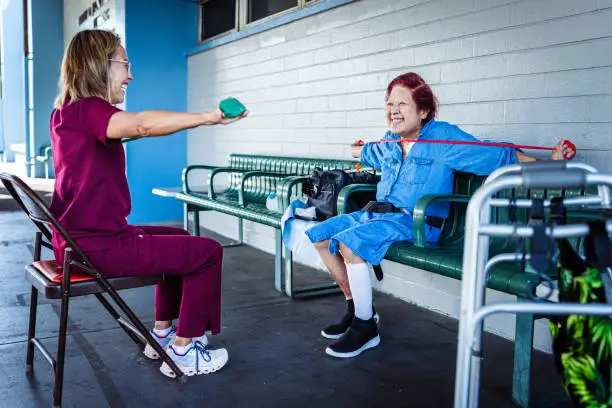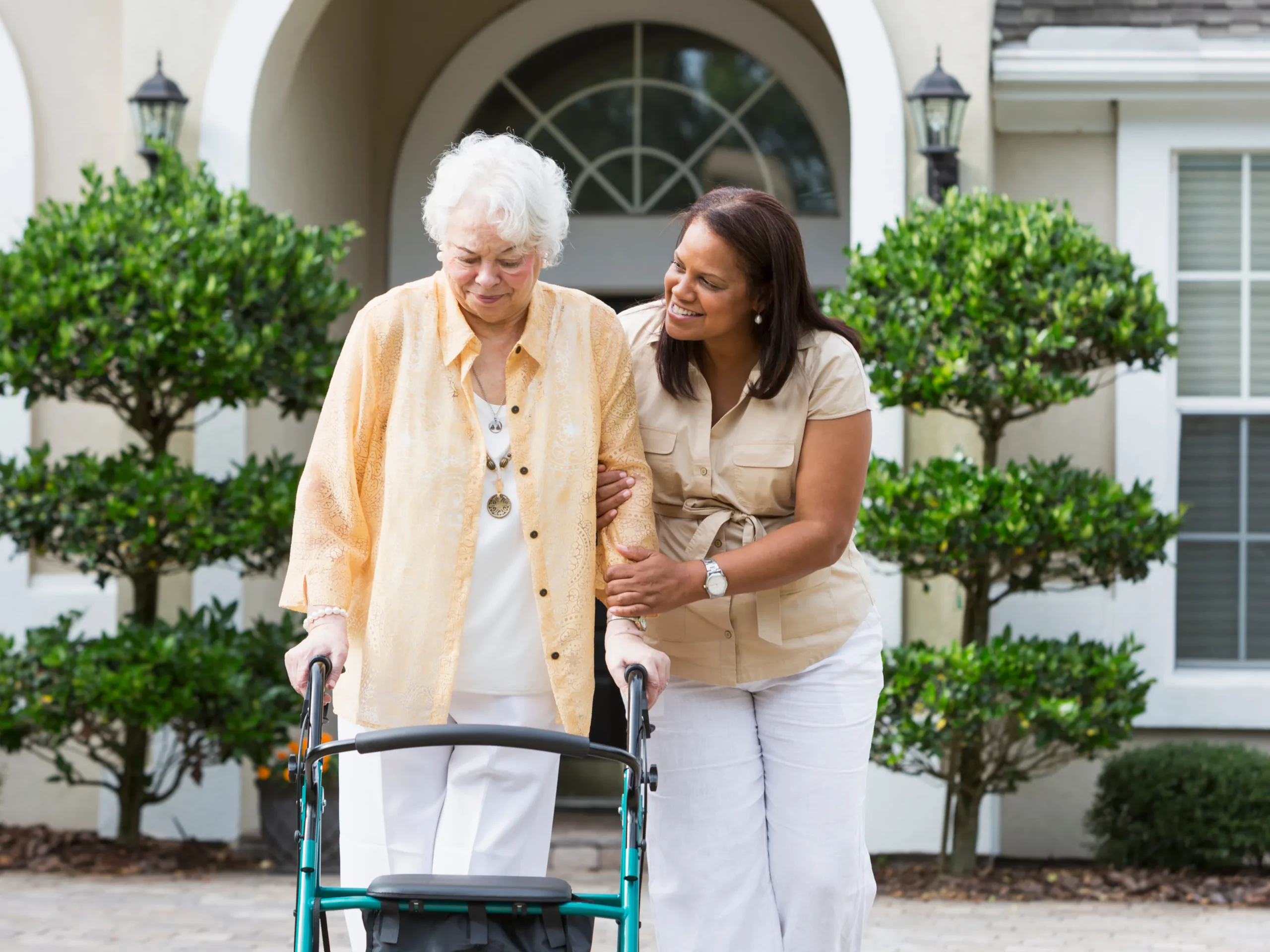If you or a loved one experiences persistent hip pain or stiffness that disrupts daily life due to conditions like osteoarthritis, rheumatoid arthritis, or osteonecrosis, and you’ve exhausted nonsurgical options without relief, hip replacement surgery can be life-changing. However, recovery won’t happen magically after leaving the hospital. As important as the surgery itself, the postoperative period requires proper hip replacement recovery care, provided by a caregiver, to ensure a swift and smooth recovery back to mobility.
What does post-surgery care look like after hip replacement surgery? Here, we’ll answer that question and share some important information so you know what to expect.
What to Expect After Hip Replacement Surgery
Immediate Recovery in the Hospital
Immediately after the surgery, you must be closely monitored for around 24-48 hours.
Transitioning to Home-Based Post-Surgery Care
Once you’re stable, the nurses and physiotherapist will help you get back on your feet, although using crutches or a walker, as soon as possible. The physiotherapist will also prepare a list of home exercise programs to help you transition to in-home post-surgery care.
Before you go home, it’s important to plan who will help you, preferably a caregiver with experience in rehabilitation care, moving around, cooking, cleaning the house, and more. Also, your home should be ready for your homecoming with:
- Rearrange furniture: Remember that you’ll walk with crutches or a walker, so rearranging your furniture to make room will make your life a lot easier.
- Place frequently used items within reach: You can put them on the table beside the bed or anywhere else that doesn’t require you to reach up or bend down.
- Install safety features: Safety features like a raised toilet seat, shower chair, and grab bar are crucial for helping you with personal activities around the bathroom.
How Long Do You Need a Caregiver After Hip Replacement Surgery?
Phase 1: First Week of Post-Surgery Care
The first week post-discharge, your post-surgery care will be all about rehabilitation. Now is the time to get to work by doing the home exercises your therapist advised you to! In this phase, the role of a caregiver extends beyond physical support; the caregiver will help make sure you do these exercises safely and give you emotional support whenever the pain and discomfort make you feel like quitting.
Phase 2: Weeks 2-4 of Recovery
During week two, or 10-14 days post-surgery, this phase will focus on gaining back your strength by including resistance exercises as the pain and swelling decrease. When you regain your ability to perform daily activities, the caregiver can adjust the support to fit your changing needs with more flexible hours.

Phase 3: Weeks 5-6 of Recovery and Beyond
As recovery moves into phase 3, post-surgery care will focus on supporting you in returning to your normal daily activities. Physical exercises will become more advanced, targeting muscle strength and joint flexibility. With continued dedication, though, you’ll be on your way to resume a more active lifestyle. However, caregiver help will still be needed for activities like outdoor walks and implementing those next-level home exercises.
Key Factors That Affect the Duration of Care Needs
Age and Overall Health
Whether we like it or not, the recovery process after hip surgery can slow down with age as the body’s healing ability decreases. With age, overall health can also decline, further slowing down the recovery process. That’s why, if you or your loved one is an older individual with or without other health issues, you may need longer assistance with hip replacement recovery care.
Type of Hip Replacement Procedure
There are several different types of hip replacement surgery; hence, asking your surgeon which one you’re getting and how long the post-surgery care is needed is a must. A total hip replacement (replacing both the ball and socket of the joint) usually needs a longer recovery of around 6 weeks to regular activity and 6 months to low-impact sports like swimming and golfing. In contrast, partial hip replacement (replacing one part of the joint) may lead to quicker recovery and caregiving needs.
Physical Therapy and Rehabilitation
Lastly, your motivation and compliance with recommended physical therapy and rehabilitation. By actively engaging in your physical therapy and following post-surgery care recommendations, you can expect to see better improvements in strength, mobility, and overall function. Ultimately, regaining independence faster and reducing the duration of care needed.
Benefits of Having a Caregiver for Post-Surgery Care

Assistance with Daily Activities
Let’s face it: you won’t be able to manage daily activities on your own during the first few weeks after surgery, no matter how hard you try (and you’re advised against it!). Having a caregiver in the post-surgery care period to help you with daily activities like meal prep, light housekeeping, mobility assistance, and even pet care will help you get the rest you desperately need to recover while keeping your life in order.
Encouragement and Emotional Support
With all the pain and discomfort, it’s sometimes human to lose motivation. When a caregiver who has witnessed all the ups and downs of someone who went through recovery after surgery is there with you, empathy and understanding create a comforting presence, helping you stay motivated and hopeful as you work through each stage of healing.
Fall Prevention and Safety Monitoring
Doing all the ‘homework’ physical exercises and trying to get around the house by yourself without supervision can be dangerous, especially during the first few weeks of hip replacement recovery. Another benefit of having a caregiver around during that crucial period is to ensure you avoid any unwanted fall accidents and that someone is there to help you.
How Sunny Days Great Lakes In-Home Care Supports Post-Surgery Recovery
Personalized Care Plans
At Sunny Days Great Lakes In-Home Care, we understand that your post-hip replacement surgery recovery differs from others. Our personalized care is tailored to your specific conditions, needs, abilities, and post-surgery care plans given by your healthcare provider, so you can regain your strength optimally and independence as soon as your body allows you to.
Experienced and Compassionate Caregivers
Our team of caregivers is skilled in supporting people recovering/rehabilitating and dedicated to offering emotional encouragement throughout the journey. Their compassionate approach ensures you receive the care you need with respect and understanding, helping you feel supported every step of the way.
End Note
Proper post-surgery care is essential for a successful hip replacement recovery. From assisting with daily activities to providing emotional support and ensuring safety, a caregiver can be instrumental in helping you regain independence smoothly and confidently. Compassionate support tailored to your specific needs will make the recovery journey more manageable and allow you to focus on healing.
If you or a loved one is considering hip replacement, don’t overlook the importance of in-home post-surgery care. Contact Sunny Days Great Lakes In-Home Care to discuss your post-surgery care needs and create a personalized plan supporting your recovery path.


